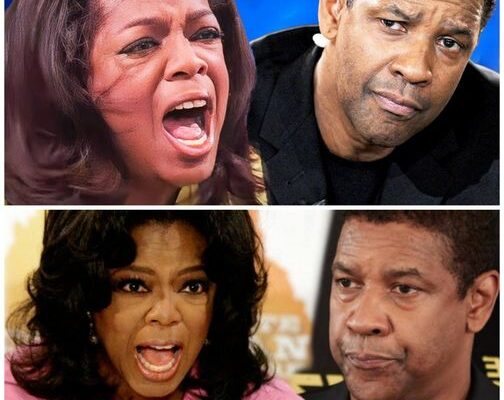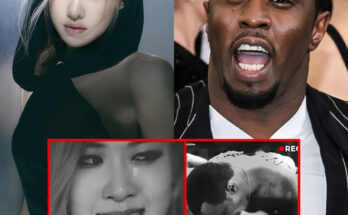(VIDEO) Oprah Winfrey Is Going Crazy When Denzel Washington Keeps Releasing Videos That Expose Oprah’s Lies and Dark Conspiracies.
Taraji P. Henson Challenges Oprah Winfrey’s Company Over Alleged Wage Discrimination
Taraji P. Henson, an acclaimed Black actress, is at the forefront of a heated battle against Oprah Winfrey’s media empire, accusing it of engaging in systematic unfair wage practices. This controversy stems from Henson’s recent involvement in Winfrey’s 2023 production,

The Color Purple. According to insider sources, Henson was paid significantly less than her skill and dedication deserved, sparking a larger conversation about pay inequality in Hollywood, particularly for Black women.
In an emotional interview with Gayle King on Sirius XM, Henson expressed her frustration with the industry’s mistreatment of Black actresses, recounting moments of exhaustion and disillusionment. Despite her consistent efforts to break through, she often finds herself at the bottom once again, as if her achievements never happened.
This sentiment has echoed throughout Henson’s career, including her experience in The Curious Case of Benjamin Button, where she was paid a mere $150,000 despite her Oscar-nominated performance. Meanwhile, her co-stars Brad Pitt and Cate Blanchett were paid millions.
Henson’s courage to speak out shines a light on a pervasive issue in the entertainment industry—pay inequality. This problem disproportionately affects Black actors, with Henson pointing out that it’s not just a personal struggle but a systemic one.
The contrast between Henson’s earnings and those of her white counterparts has become a glaring example of Hollywood’s double standards.
Ironically, the accusations are particularly shocking given Oprah Winfrey’s reputation. Winfrey, long seen as a champion of Black empowerment and equality, now faces backlash for allegedly undervaluing Black talent within her own productions.
Fans and industry insiders alike have been left wondering how someone who has personally experienced discrimination could allow such disparities under her leadership.
Other Black actresses involved in The Color Purple, such as Danielle Brooks, Halle Bailey, and Fantasia Barrino, have also reportedly faced similar underpayment issues. This troubling pattern of undervaluing Black talent extends beyond any single production or individual, pointing to a broader, more systemic problem in Hollywood.
As more people come forward, the spotlight on wage inequality and unfair treatment in the entertainment sector only grows brighter.
However, challenging powerful figures in the industry is not without its risks. Oprah Winfrey’s influence stretches far beyond entertainment, and her critics often face severe professional consequences.
Comedian and actress Mo’Nique, for instance, has been outspoken about her experiences with underpayment and discrimination in Hollywood, yet she has found herself unofficially blacklisted, becoming an outcast in an industry that values compliance over dissent.
Many celebrities, aware of the potential backlash, have chosen to remain silent, prioritizing their careers over speaking out. This silence speaks volumes about the complex power dynamics in Hollywood, where even those who have suffered prefer not to risk public scrutiny by confronting the media mogul.
As the scandal surrounding Winfrey’s alleged mistreatment of Black actresses continues to unfold, tensions have surfaced within the cast of The Color Purple. Rumors suggest that actresses like Brooks and Barrino appeared uncomfortable around Winfrey during a promotional photoshoot. These subtle cues point to an undercurrent of strained relationships as more people come forward with similar grievances.
Amidst this controversy, a rare voice of support has emerged in the form of Denzel Washington. The Academy Award-winning actor has long been an advocate for Black artists in Hollywood, using his influence to combat systemic racism and discrimination.
Washington’s unwavering support for Black performers, including Henson and Mo’Nique, stands in stark contrast to the alleged behavior of his contemporaries, including Winfrey.
Another vocal critic of Winfrey’s actions is rapper and producer 50 Cent. He has openly criticized Winfrey for what he sees as her double standards in addressing racial issues in Hollywood, accusing her of focusing on demonizing Black men while turning a blind eye to the misconduct of powerful white figures.
50 Cent has even invited Henson to join his production company, G-Unit Films and Television, in a show of solidarity.
The irony of Oprah Winfrey’s position in this controversy cannot be overlooked. Once celebrated as a trailblazer for racial justice, her alleged involvement in perpetuating pay inequality for Black actresses raises serious questions about her commitment to the causes she has long championed.
Family members have even come forward to cast doubt on Winfrey’s public persona, with her cousin Katherine Carr asserting that Oprah exaggerated her hardships to build her brand.
While Winfrey has not publicly addressed these accusations, the fallout from the scandal is significant. As the entertainment industry grapples with these revelations, the question remains: how could someone who has experienced so much discrimination herself become complicit in the very injustices she once fought against?
Taraji P. Henson’s courageous stand is just one piece of a larger movement calling for accountability and change in Hollywood. Whether these accusations will lead to meaningful reform or further entrenchment of the industry’s deep-rooted inequities remains to be seen.



